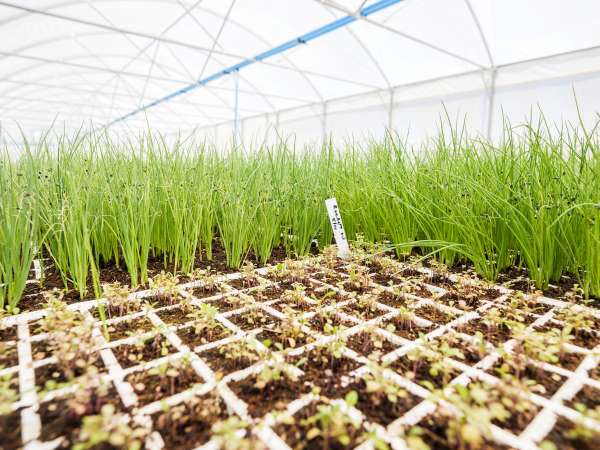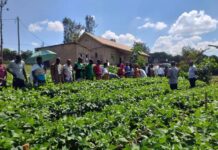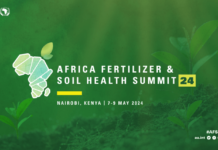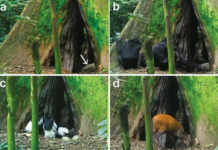Distell has embarked on an eco-friendly, water recyclable aquaponics project to grow a variety of vegetables and also farm fish, at its Nederburg Winery in Paarl. As a hub-and-spoke venture, it is geared towards building skills, empowering local entrepreneurs, and growing rural employment in the greater Drakenstein area.
The company has, via its Agri+Gator empowerment arm, teamed up with majority black-owned Mi-Crop Group Holdings to produce pesticide-free rainbow trout, herbs, and specialty salad crops all year round.
Eric Leong Son, Distell’s acting director of corporate affairs, explains: “We started working on this project more than a year ago. It’s very much aligned with Distell’s purpose of creating memorable moments and crafting a better future, as well as the company’s vision of making a difference by creating shared value in chosen markets. These types of transformational partnerships, involving multiple stakeholders in our value chain, truly deliver tangible value for the community at large, and we would like to thank all our partners on this journey.”
Distell is providing the land, water, and electricity at its Nederburg farm, and is co-funding the project with Mi-Crop, that is providing the technology, infrastructure, expertise, and training of staff. Mi-Crop’s Lester Hugo is managing operations at the farm and transferring skills to formerly seasonal workers who are now being employed full-time.
In this, the first phase of the enterprise, the operation is supplying Nederburg’s own restaurant kitchen as well as other eateries in the area with its sustainably grown natural aquaponics produce. It has also lined up contracts with several high-end retail processors and distributors.
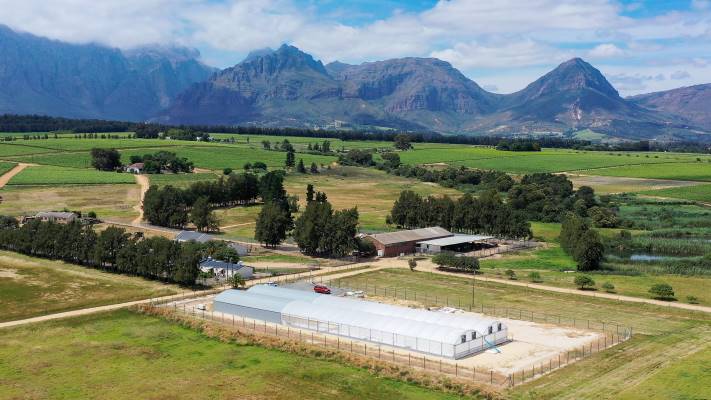
Explaining the closed-loop nature of the project, Distell’s Charles Wyeth, who is acting head of the company’s sustainability operations, says: “The same body of water is used to farm the fish and plants. Much of the fish waste is beneficial to the plants, but to avoid any potential ammonia uptake by the herbs and vegetables, the water is first purified with bacteria before it is fed to the plants in a recirculation process.”
Mimicking the biological symbiosis that occurs in nature, bacteria within the controlled aquaponic production system break down the fish waste and turn it into a usable form of nutrients for the plants. Plant roots absorb the nutrients from the water while cleaning the living environment for the fish. Due to the self-controlling ecosystem that is established, the food is extremely natural and healthy, even better than organic food. As no water is wasted, it also uses less than 10% of the water that would be used in open-field growing.
Adds Maruis Conradie, CEO of Mi-Crop: “Establishing a healthy bacterial colony involves the steady and constant introduction of ammonia into the system via the fish and their waste. This feeds and grows the bacterial colony, in the process creating a biofilter. Essentially, nitrifying bacteria convert ammonia into nitrites and then into nitrates that are taken up by the plants. As ammonia and nutrient levels must be closely monitored at all times, this is a highly skilled and capital-intensive process.”
Currently the project involves a 500 sq m trout and packaging facility, established alongside a 1 000 sq m hydroponic greenhouse that cultivates miniature leafy greens and herbs like thyme, mint, basil, coriander, baby spinach, rocket and exotic lettuces all year round.
Alternative energy sources have been established as a back-up, so no disruptions result from central or local authority power outages.
The trout, herbs and other exotic greens will be featured on the menu of Nederburg’s The Manor restaurant from November.
Wyeth confirms that the intention is to scale up the venture to three times its current size, expanding it to 3 000 sq m. “Staff are being trained in this extremely detailed and sensitive type of work. In addition to the full-time employment opportunities created in running the aquaponics facility, skills will also be developed in packaging, marketing, sales, and cold-chain distribution.”
He says the plan is to identify more local wine farms and small-scale BEE partners in the greater Drakenstein area to co-fund, co-own and operate multiple sites with the venture in its expanded phases and will also include the involvement of local black farmers.
“As the project grows, more employees will be upskilled to participate. We envisage that once fully up and running, around 10 additional work opportunities will have been created at the Nederburg hub alone. With its multiplier effect, this will provide a much-needed injection into the local economy.”
He says this latest venture at Nederburg is becoming an extension of the winery’s long-standing social and eco-sustainability focus. Steps already undertaken at the farm include regenerative viticultural practices conducted that range from increasing biodiversity through cover cropping, clearing of alien riparian vegetation, and creating biochar from biomass on the farm to add to the microbial life, structure, water-holding, and carbon sequestration of the soil.



